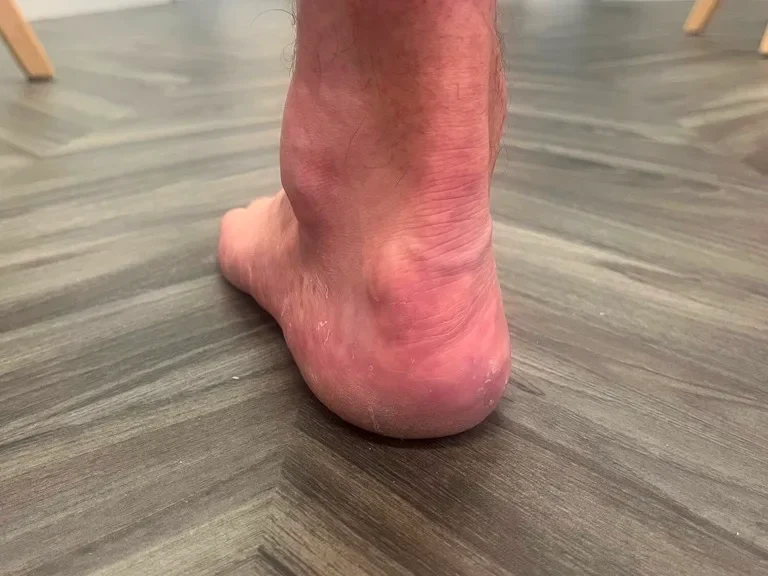Waking up to heel pain can be a frustrating way to start your day. If you’ve experienced sharp, stabbing pain in your heel upon taking your first steps in the morning, you’re not alone. This common issue, often associated with a condition called plantar fasciitis, can disrupt your routine and diminish your quality of life.
There are several reasons why heel pain is significantly worse in the mornings. Understanding these factors can help you manage discomfort and improve your morning routine. Here’s a breakdown of why heel pain tends to be more intense after a night’s rest:
1. Rest and Inactivity
When you sleep, your body is inactive for several hours. This inactivity can lead to stiffness in the tendons and ligaments of your feet, especially the plantar fascia. As you wake up and take your first steps, the sudden stretch on these tight tissues can cause sharp pain, often described as “first-step pain.”
2. Fluid Accumulation
During the night, your body can retain fluid in the tissues of your feet. This swelling can add pressure to the heel, making it more sensitive when you first get up. As you move around, the fluid may redistribute, leading to some relief as the day goes on.
3. Inflammation
Conditions like plantar fasciitis involve inflammation of the plantar fascia. Inflammation can worsen during periods of inactivity, and sleeping can allow for an accumulation of inflammatory markers in the affected area. As you start moving again, this inflammation can lead to heightened sensitivity and discomfort.
4. Tendon Tightness
The Achilles tendon and other surrounding muscles may become tight overnight, especially if you have not engaged in stretching or mobility work before bed. When you take your first steps in the morning, the sudden stretching of these tight structures can trigger pain.
5. Lack of Warm-Up
Throughout the day, as you walk and move, your muscles and tendons warm up, increasing flexibility and reducing pain. In the morning, the sudden transition from rest to activity doesn’t allow for this gradual warm-up, which can intensify the discomfort.
Fortunately, there are effective strategies to help ease that morning pain and improve your overall foot health. Here are some tips to get you started!
6. Gentle Stretching Before You Get Out of Bed
One of the simplest ways to alleviate morning heel pain is to incorporate gentle stretching into your morning routine. Here are a few effective stretches you can do while still in bed:
- Calf Stretch: Sit on the edge of your bed with one leg extended. Pull your toes toward you while keeping your knee straight. Hold for 15-30 seconds and switch legs.
- Plantar Fascia Stretch: While still seated, cross one foot over the opposite knee. Use your hand to gently pull your toes back toward your shin to stretch the plantar fascia. Hold for 15-30 seconds.
These stretches can help warm up your muscles and tendons, reducing stiffness and discomfort as you start your day.
7. Use Supportive Footwear
Wearing supportive shoes is crucial, especially in the morning when your feet are at their most vulnerable. Avoid walking around in slippers or flip-flops that lack proper support, and steer clear of walking barefoot, especially on hard surfaces, as this can exacerbate discomfort. Instead, opt for shoes with good arch support and cushioning. If you spend a lot of time on your feet, consider investing in custom orthotics for added support.
8. Gradual Transition to Activity
After waking up, give your feet time to adjust. Rather than jumping straight into vigorous activity, take a few moments to move your feet and ankles gently. Flex and point your toes, and roll your ankles in circles. This gradual transition can help ease the stiffness and reduce pain. You might also consider incorporating a short, gentle walk around your home to promote blood flow and loosen tight muscles before engaging in more strenuous activities.
9. Consult a Podiatrist
If morning heel pain persists despite these strategies, it may be time to consult a podiatrist. At LR Podiatry, a professional can conduct a thorough examination, assess your foot mechanics, and develop a personalised treatment plan. This may include physical therapy, custom orthotics, or other interventions tailored to your needs.
Conclusion
Morning heel pain can be a frustrating start to your day, but understanding its causes and implementing effective management strategies can make a significant difference. By incorporating gentle stretches, investing in supportive footwear, and gradually transitioning into your daily activities, you can alleviate discomfort and enjoy a more pain-free morning routine.
If you continue to struggle with heel pain, don’t hesitate to seek professional advice. At LR Podiatry, we’re dedicated to helping you find relief and get back to your active lifestyle. Remember, every step counts—so let’s make sure they’re pain-free!
